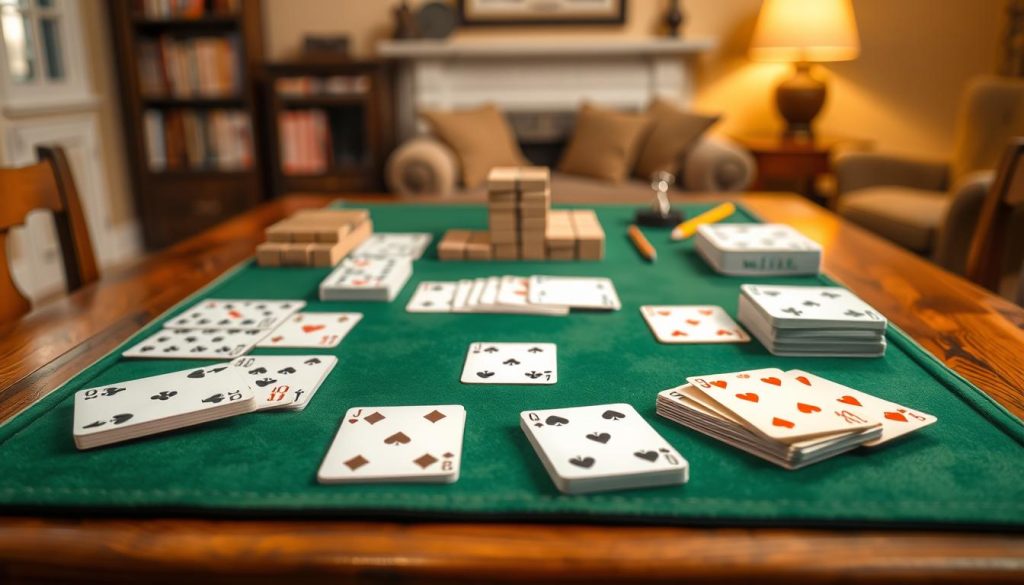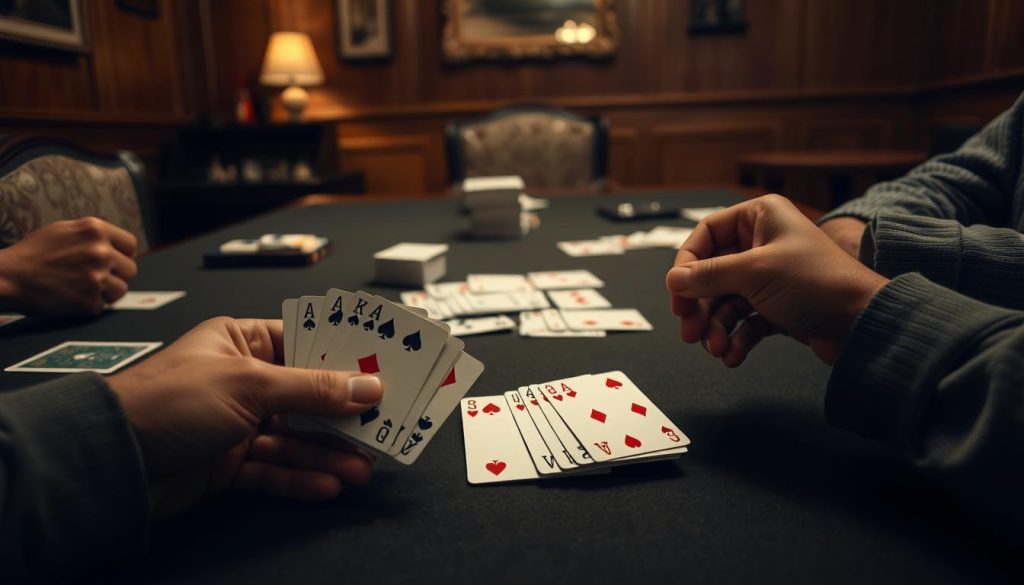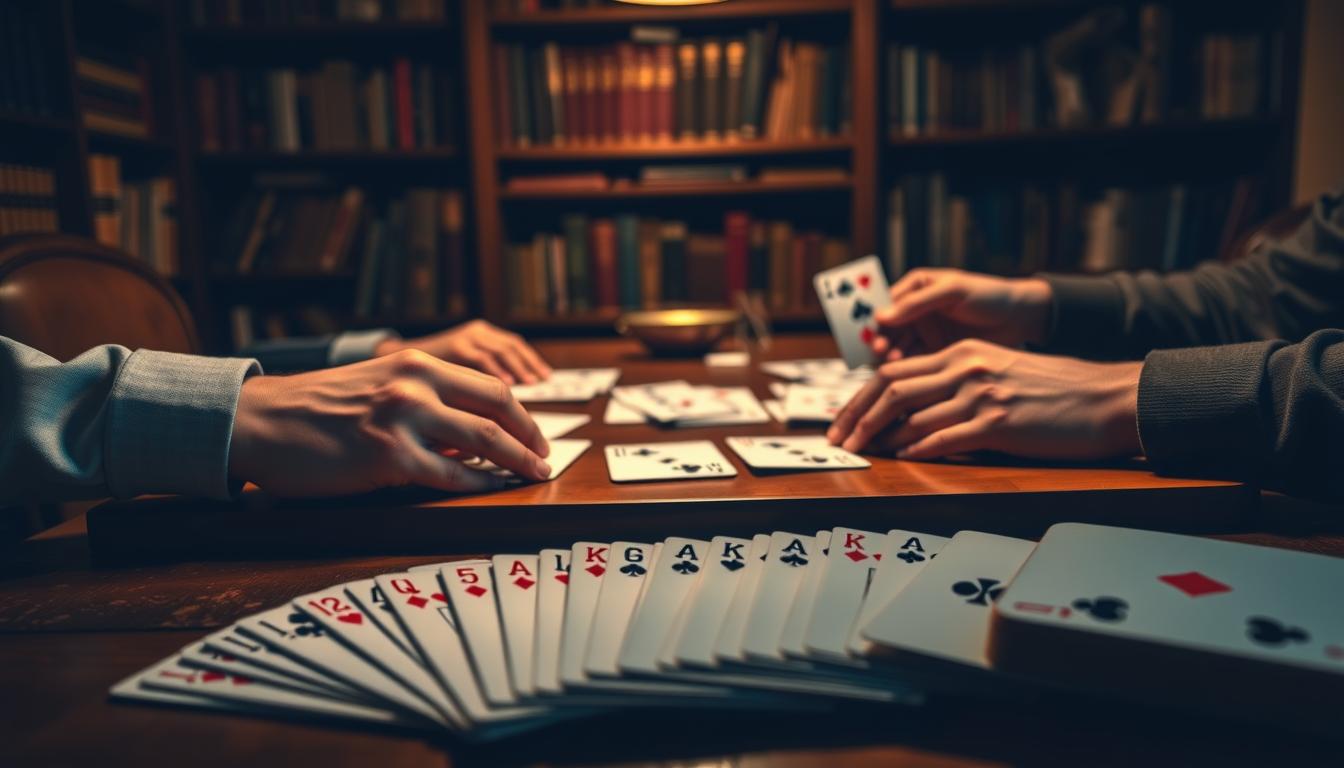Welcome to the exciting world of this classic card game! If you’ve ever wondered about learning this timeless favorite, you’re in the right place. Many people feel intimidated when they first consider picking up a new card game, but there’s absolutely no need to worry.
This comprehensive guide makes Rummy for beginners completely manageable. We’ll walk you through every essential detail you need to start playing confidently. From basic rules to winning strategies, everything is explained in simple, easy-to-follow steps.
What makes this card game so special? It perfectly blends strategy with social fun, creating memorable moments with family and friends. Generations have enjoyed its engaging gameplay, and now it’s your turn to discover why.
By the end of this guide, you’ll understand how to play Rummy like a pro. We’ll cover card combinations, scoring systems, and smart tactics that give you an edge. Ready to dive in and master this beloved game?
Why Rummy Should Be Your Next Card Game Obsession
What makes a card game worth your time today? It’s the mix of mental challenge, social fun, and entertainment. Rummy has all these, making it great for new and experienced players.
Rummy is different from games that rely too much on luck or need lots of study. It’s easy enough for family nights but also has strategy for those who love to compete.
The Perfect Balance of Skill and Luck
Rummy is all about smart thinking and a bit of luck. You can’t win just by luck, but you don’t need to know everything like in chess or poker.
It’s about reading your cards, planning, and adjusting to the game. Luck makes it exciting and means anyone can win.
Social Benefits That Go Beyond the Cards
Rummy brings people together. It’s a game that makes you talk, laugh, and compete in a friendly way. It creates memories that last.
Unlike games you play alone or in very competitive settings, rummy is relaxed. It’s a game where people of all ages can connect and make friends.
| Game Aspect | Rummy Benefits | Other Card Games |
|---|---|---|
| Learning Curve | Quick to learn, lifetime to master | Often too simple or overly complex |
| Social Interaction | Encourages conversation and bonding | May require intense focus or silence |
| Age Range | Suitable for ages 8 to 80+ | Limited age appeal |
| Game Duration | Flexible 15-45 minutes | Too quick or excessively long |
Why I Believe It’s the Best Gateway Card Game
I’ve introduced many to card games, and rummy always wins. It’s interesting but easy to learn, whether online or in person.
Rummy teaches you to recognize patterns, plan, and understand chances. These skills help in other games and real life, making rummy fun and educational.
Setting Up Your First Rummy Game Like a Pro
Rummy is easy to start with. It doesn’t need a lot of setup like big board games. You can start playing with cards quickly.

What You’ll Actually Need (Spoiler: It’s Less Than You Think)
You only need a few things. Just a standard 52-card deck and a flat surface. That’s all.
No fancy boards or tokens are needed. You might already have what you need in your kitchen. A table or even a clean floor is great for playing.
- One standard deck of playing cards
- Flat surface for card placement
- Paper and pencil for scorekeeping (optional)
- Comfortable seating for all players
The Sweet Spot for Player Count
The best number of players is 3-4. This makes the game fun and engaging.
Two players make it strategic but less social. Six players can slow things down. Four players are usually the best for most groups.
Dealing Cards the Right Way From Day One
Start with the right card dealing to get good at Rummy. Deal 7 cards to each player for 2-4 players. For 5-6 players, deal 6 cards each.
Put the rest of the deck face-down as your draw pile. Turn the top card face-up next to it to start the discard pile. Now you’re set to play like a pro.
How to Play Rummy: The Complete Step-by-Step Guide
Learning rummy starts with understanding a few key concepts. These rules might seem hard at first. But they’re simple once you break them down.
Rummy is like solving a puzzle. You arrange cards to make winning groups. Your goal is to be the first to organize all your cards.
Understanding Melds: Your Ticket to Victory
Melds are the heart of rummy strategy. They are groups of three or more cards that follow patterns. Every card in your hand should become part of a meld to win.
There are two types of melds. Knowing both gives you flexibility, no matter what cards you get.
Runs: Building Sequential Success
Runs are sequences of three or more cards in the same suit. For example, 4-5-6 of hearts or 9-10-Jack-Queen of spades. Cards must be in order and share the same suit.
Aces can start or end a sequence. But they can’t wrap around (King-Ace-2 doesn’t work).
Sets: Mastering the Match Game
Sets are three or four cards of the same rank but different suits. Think three 8s (one heart, one club, one diamond) or four Kings from all four suits.
You can’t use two cards of the same suit in a set. This rule keeps the game balanced and prevents easy wins.

The Draw and Discard Rhythm That Defines the Game
Every turn is simple: draw one card, then discard one. This rhythm adds strategy to rummy.
You can draw from the deck or the discard pile. Drawing from the discard pile gives you clues about opponents’ strategies.
When discarding, avoid giving opponents cards they obviously need. Watch what they pick up and try not to help them complete their melds.
Going Out: Timing Your Moment of Glory
Going out means organizing all your cards into valid melds. You can go out by melding all cards at once or by melding most and discarding the last card.
Timing is key. Going out too early might cost you points. Waiting too long lets opponents go out first.
Some players keep one unmatched card until the end. This strategy keeps opponents guessing when you’ll go out.
Scoring Simplified (No Math Degree Required)
Scoring in rummy is easy. Face cards (Kings, Queens, Jacks) are worth 10 points each. Aces are worth 1 point, and number cards equal their face value.
When someone goes out, everyone else counts unmelded cards as penalty points. The player who went out scores zero for that round.
Games are played to a point total, like 100 or 500 points. The player with the lowest score when someone reaches that threshold wins.
Smart Strategies That Separate Winners from Weekend Players
Good rummy players think strategically. These tips will make your game better. You’ll win more often by using smart tactics.
Reading Opponents: My Favorite Psychological Tricks
Notice how fast players grab cards from the discard pile. If they hesitate, they might be thinking about a card that helps them. Quick grabs mean they really need that card.
Look at players’ faces when they draw cards. A smile or relaxed look means they got something good. Sighs or quick discards show they’re not happy.
The Art of Strategic Discarding (What Not to Give Away)
Don’t give away cards that could complete obvious sequences. If someone takes a 7 of hearts, don’t throw the 6 or 8 of hearts for a while.
Keep middle-value cards longer than high or low ones. Cards like 6, 7, and 8 are more useful for making runs. This keeps your options open and stops opponents from winning.
Risk Management: When to Play It Safe vs. Go Bold
Play it safe if you have a strong hand. Don’t risk breaking up good combinations for small gains.
Be bold when you’re behind and need to catch up. Taking smart risks can force opponents into tough choices.
The Biggest Beginner Blunders I See Every Time
New players hold onto high-value cards too long. They hope to use them in melds. Smart players discard face cards early to avoid penalty points.
Beginners often give away their plans by picking cards too obviously. Mix up your card choices to keep opponents guessing.
Finally, beginners often miss chances to win because they focus too much on perfect melds. It’s okay to settle for good enough.
Why Starting Your Rummy Journey Today Is the Best Decision You’ll Make
Rummy is special because it connects people through strategy. You have all you need to start this rewarding card game journey.
It’s easy to start. Just grab a deck of cards and invite two friends. In no time, you’ll be excited to make melds and guess what your opponents have. You don’t need fancy gear or long lessons.
Social gaming is key for making real friends. Rummy offers breaks for talking while keeping everyone playing. See how quickly people become friends over this classic game.
Your brain loves the challenge of strategy. Every game is a new puzzle to solve and choices to make. The more you play, the smarter you get.
Don’t wait for the perfect time. Tonight is the best time to play Rummy with your family or friends. The skills you learn here will help, but practice makes perfect.
Start with the basics and grow your confidence. Soon, you’ll find your own way of playing and favorite strategies. Becoming good at Rummy happens quicker than you think.
Your first game is waiting. Deal the cards and start making memories that will last long after the game ends.

